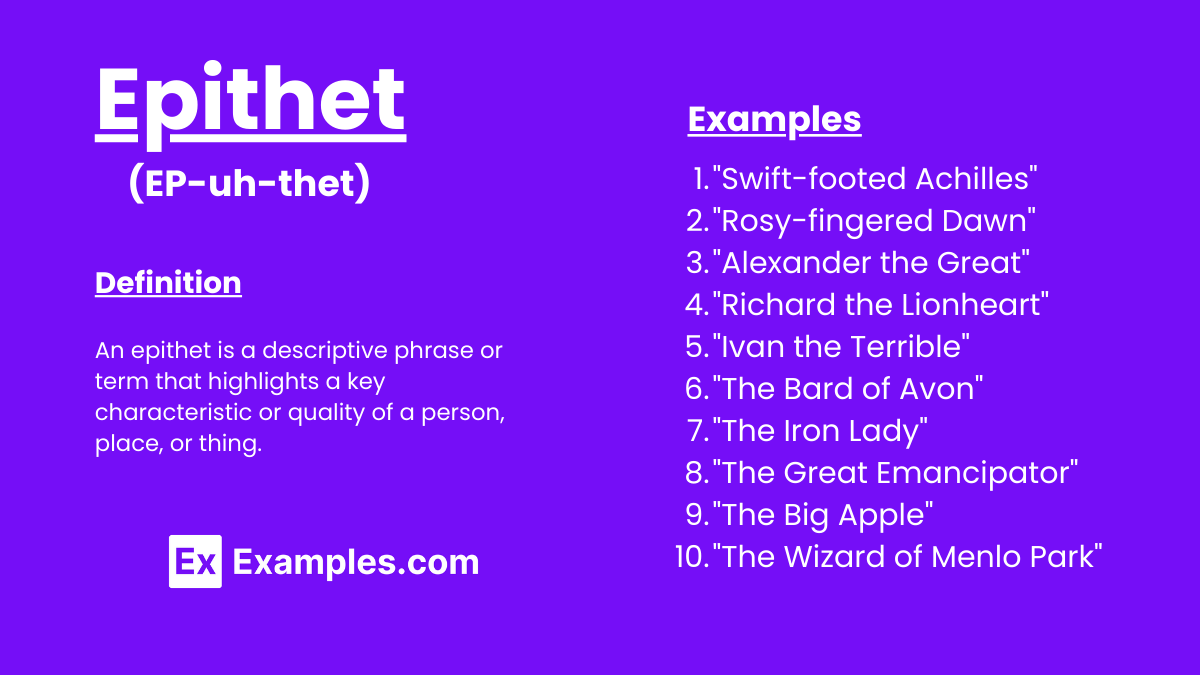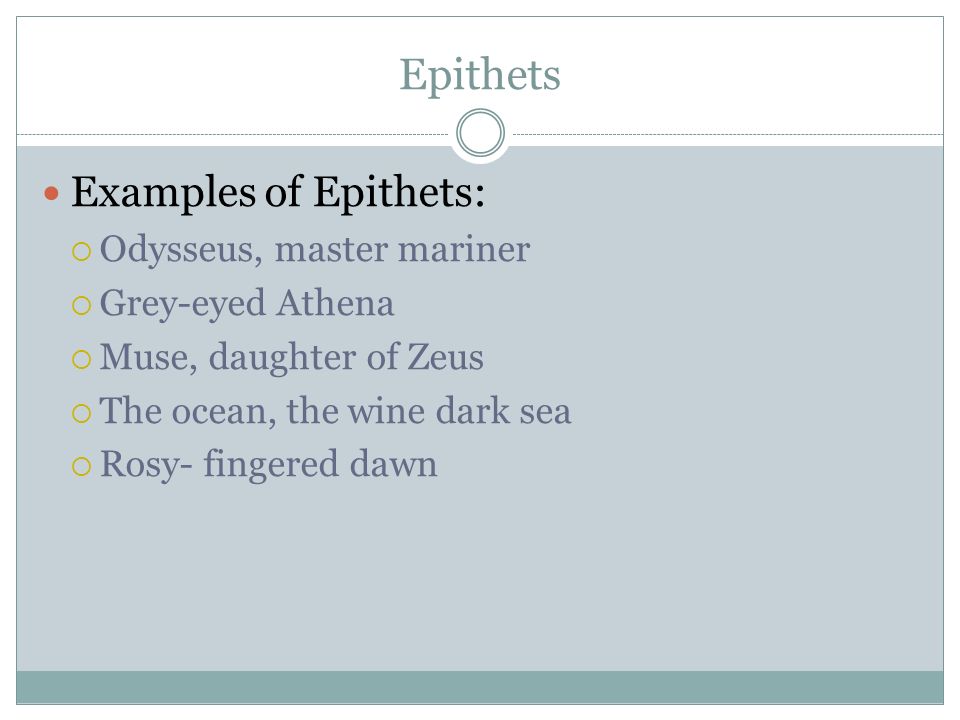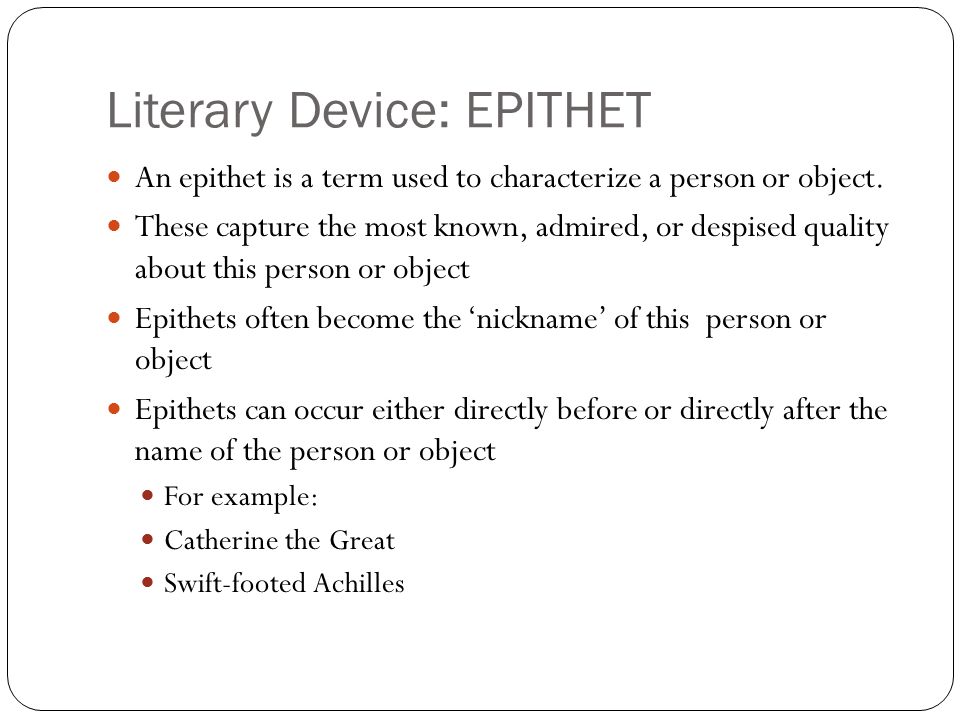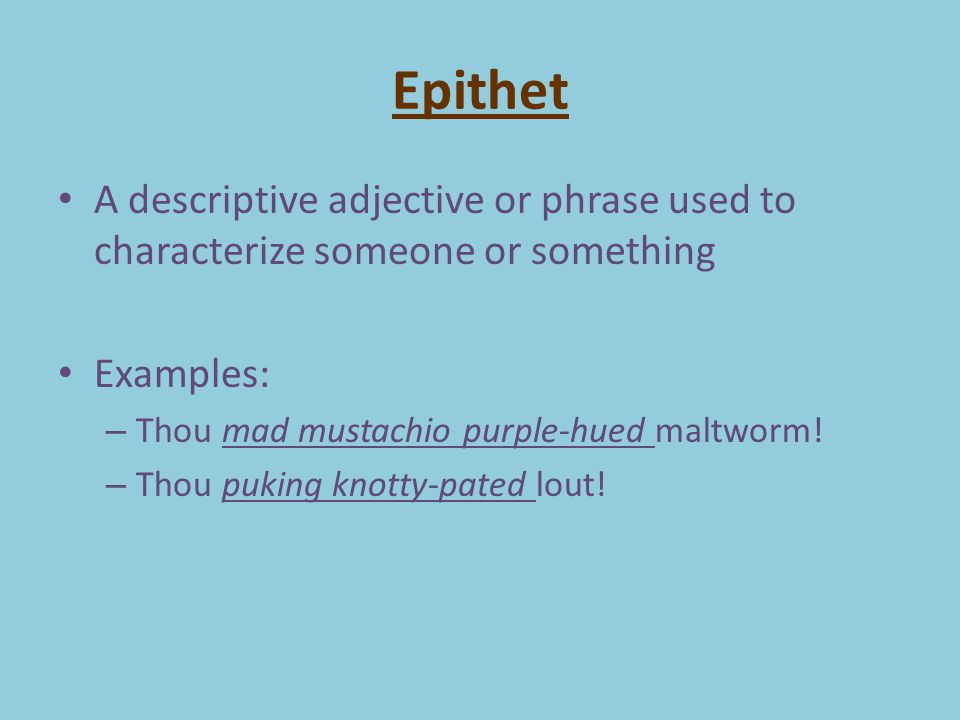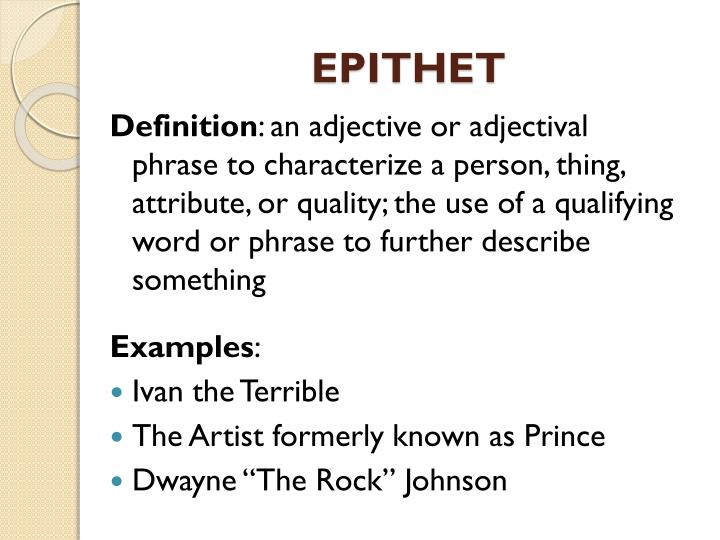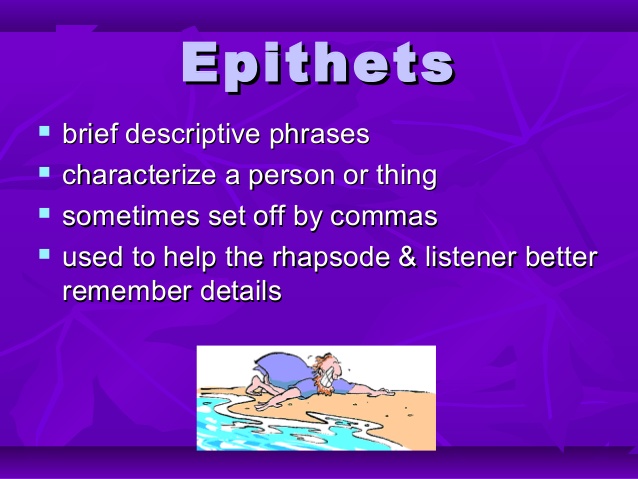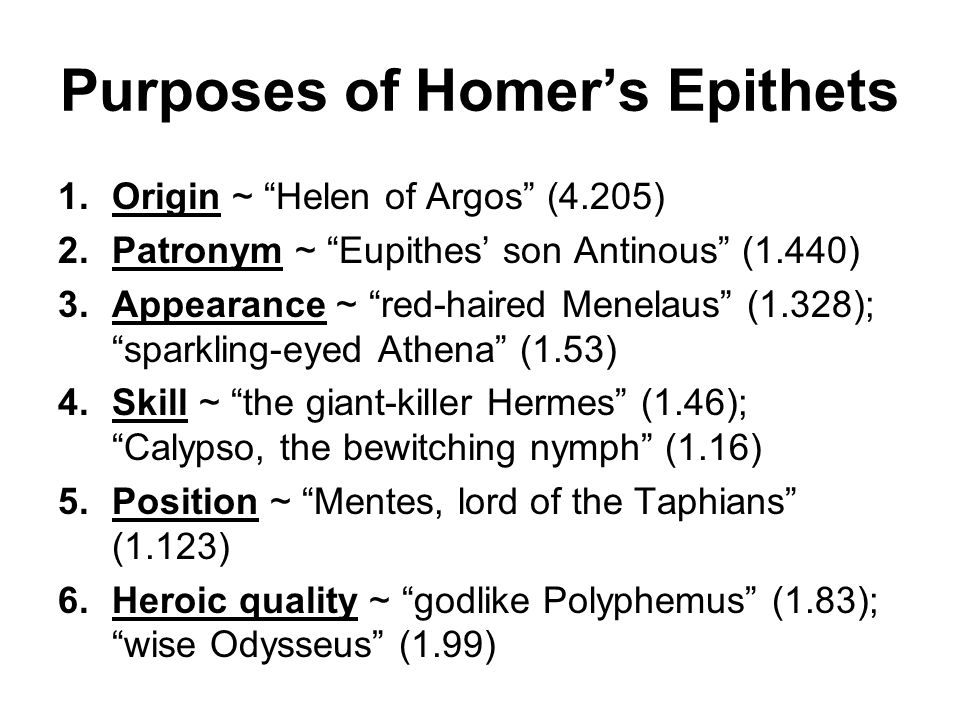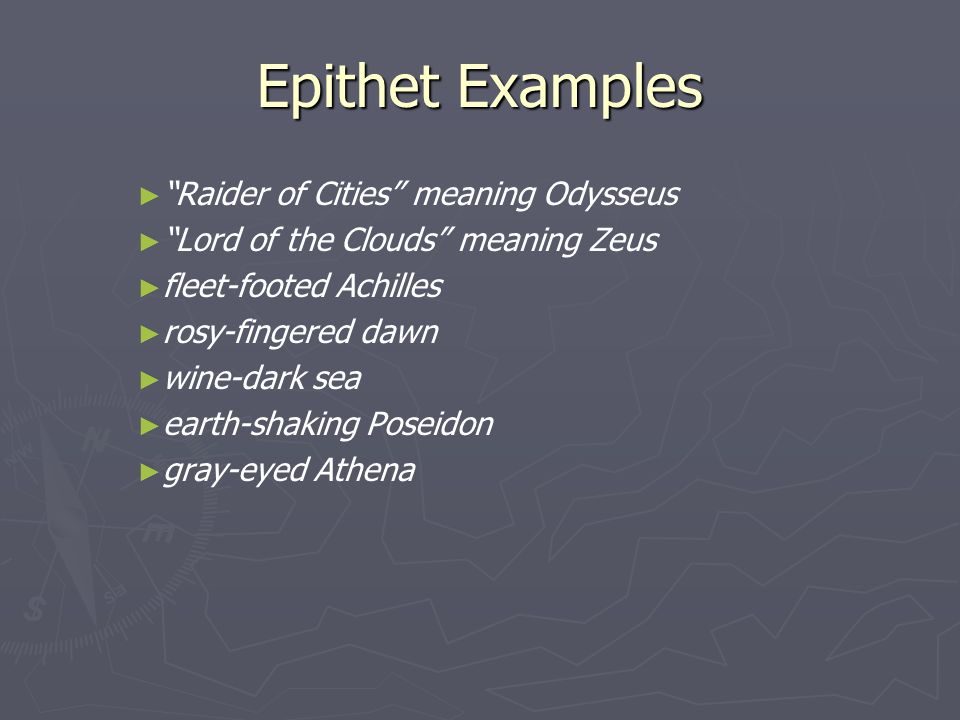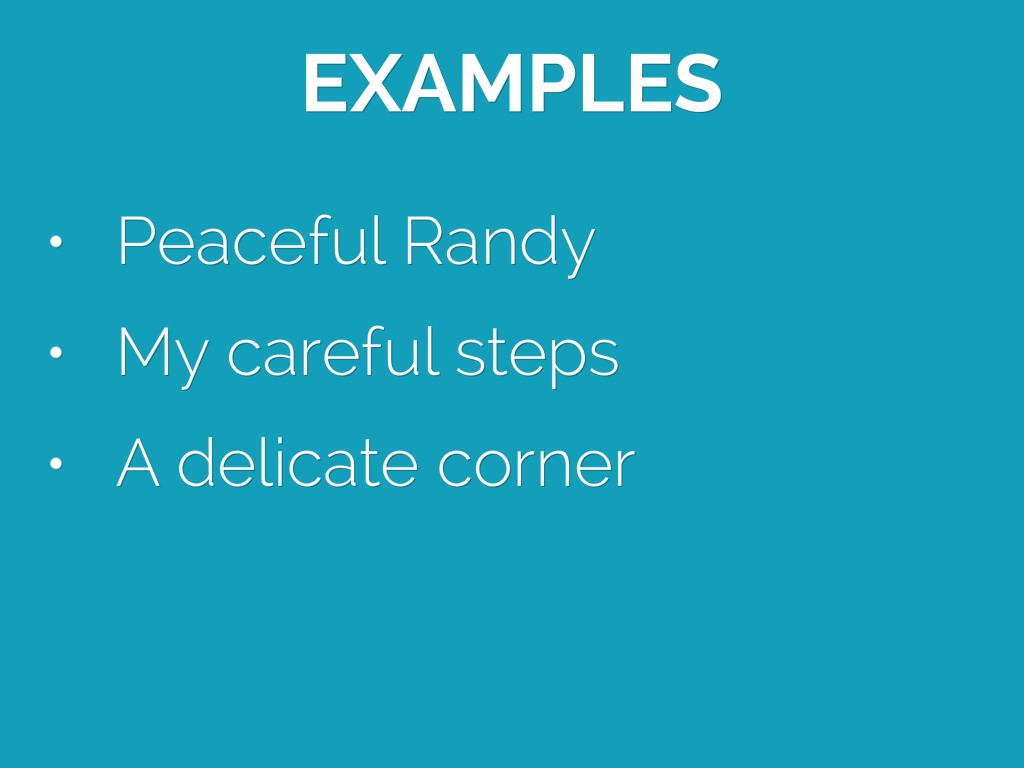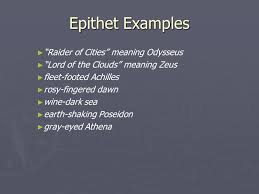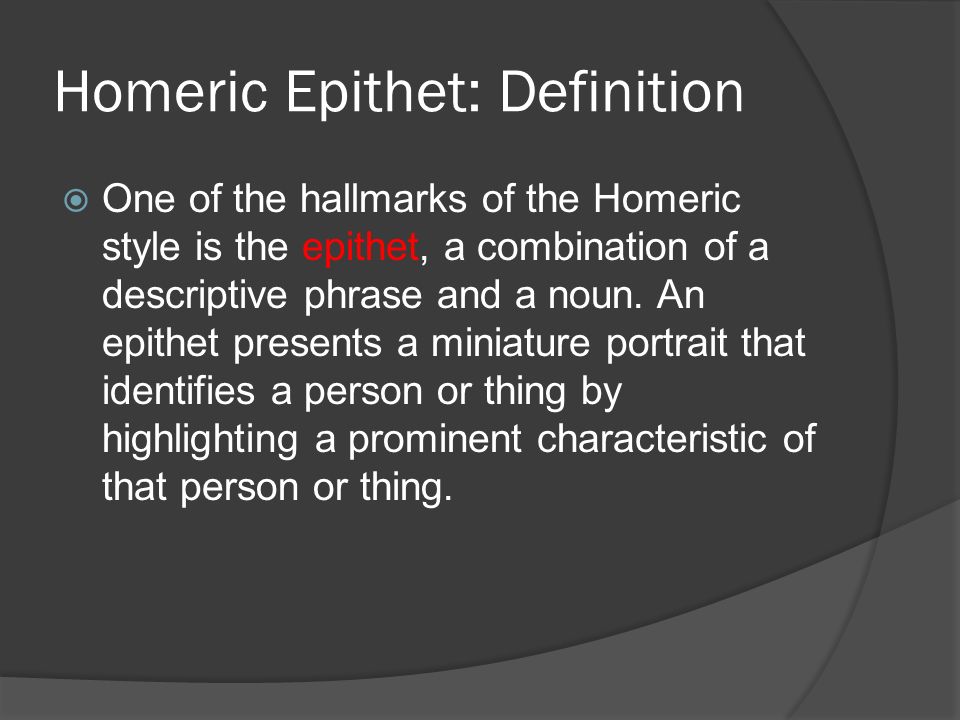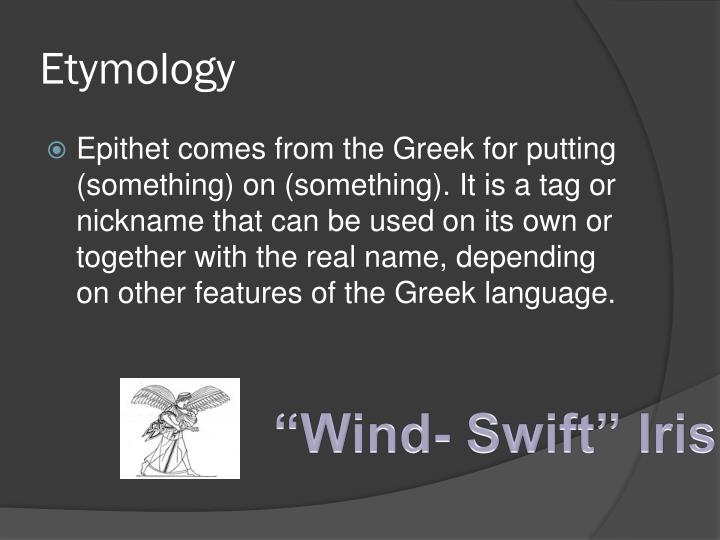Epithet
The word epithet can be traced back to its Greek origins meaning “attributed or added.” It is considered a byname, or a descriptive term, word, or phrase that accompanies or occurs in a place of a name and that which has entered common usage. It has developed various shades of meaning when applied to seemingly real or fictitious people, divinities, objects, and even binomial nomenclature.
Epithet can also be a descriptive title such as Pallas Athena for the Greek goddess of wisdom; Alfred the Great; the King of Wessex; Suleiman the Magnificent, the tenth and longest-reigning sultan of the Ottoman Empire; or Wladyslaw I the Elbow-high, who was a king of Poland. You may also like simple sentence examples.
All such great people who have been given the highest regard by blessing them with a name and a title with which anyone in the world will recognize as theirs.
However, in contemporary use, epithet often refers to an abusive, defamatory, or derogatory phrase, such as racial or animal epithet. Thankfully, this use is criticized by Martin Manser and other proponents of linguistic prescription. You may also check out complete and incomplete sentences.
What is an Epithet? – Definition
An epithet is a descriptive term or phrase that highlights a characteristic or quality of a person, place, or thing, often serving as a literary device to add depth and vividness. It is typically used to provide insight into the nature or attributes of the subject, enhancing the reader’s understanding and engagement. Epithets can be complimentary or derogatory and are frequently employed in poetry and prose to evoke imagery and emotion. Classic examples include “swift-footed Achilles” in Homer’s “Iliad” or “Alexander the Great,” where the epithet “the Great” emphasizes Alexander’s notable achievements and status. By encapsulating significant traits in a succinct phrase, epithets contribute to the richness and texture of literary works, making descriptions more powerful and memorable.
Epithet Pronunciation
Epithet is pronounced as ˈe-pə-ˌthet.
Here’s a phonetic breakdown:
- Ep as in “step”
- i as in “it”
- thet as in “bet” with a “th” sound
You can also break it down like this:
- Ep-i-thet
Epithet examples
Homeric Epithets:
- “Swift-footed Achilles”
- “Rosy-fingered Dawn”
Historical Figures:
- “Alexander the Great”
- “Richard the Lionheart”
Literary Characters:
- “Catherine the Great” (from history, also used in literature)
- “Ivan the Terrible”
Descriptive Epithets:
- “Star-crossed lovers” (from Shakespeare’s “Romeo and Juliet”)
- “Iron Lady” (referring to Margaret Thatcher)
Mythological Figures:
- “Zeus the Thunderer”
- “Hera the White-Armed”
Modern Examples:
- “The King of Pop” (Michael Jackson)
- “The Big Apple” (New York City)
- “The Bard of Avon” (William Shakespeare)
- “The Father of His Country” (George Washington)
- “Old Hickory” (Andrew Jackson)
- “The Land of the Rising Sun” (Japan)
- “The Iron Chancellor” (Otto von Bismarck)
- “The Sun King” (Louis XIV of France)
- “The Wizard of Menlo Park” (Thomas Edison)
- “The City of Light” (Paris)
- “The Great Emancipator” (Abraham Lincoln)
Epithet Sentence Examples
- “Swift-footed Achilles dashed across the battlefield, his spear ready for combat.”
- “The Iron Lady, Margaret Thatcher, held steadfast in her political convictions.”
- “Catherine the Great expanded the Russian Empire and modernized its institutions.”
- “Richard the Lionheart led his troops with unwavering bravery during the Crusades.”
- “The Bard of Avon, William Shakespeare, penned timeless works that still resonate today.”
- “Old Hickory, Andrew Jackson, was known for his tough and unyielding nature.”
- “Zeus the Thunderer commanded the skies with his powerful lightning bolts.”
- “Paris, the City of Light, dazzles visitors with its historic landmarks and vibrant culture.”
- “The Sun King, Louis XIV, reigned over France with grandeur and absolute power.”
- “Thomas Edison, the Wizard of Menlo Park, revolutionized the world with his numerous inventions.”
Epithet Examples for Students
- Albert the Genius solved the complex math problem effortlessly.
- Lisa the Bookworm was always found in the library, reading.
- Jake the Athlete won first place in the track and field event.
- Nina the Artist painted beautiful murals on the school walls.
- Sam the Tech Whiz fixed the classroom computer in no time.
- Emma the Musician played the piano with exceptional skill.
- Tom the Leader organized the charity event successfully.
- Lucy the Scientist conducted fascinating experiments in the lab.
- Mike the Historian knew everything about ancient civilizations.
- Anna the Poet wrote moving verses that inspired her peers.
Examples of Epithets
Understanding Epithets with Examples
Sample Epithets
Definition and Examples of Epithet
What Are Epithets?
Purposes of Homer’s Epithets
Simple Epithet Examples
Free Epithet Example
Standard Epithet Examples
Homeric Epithets: Definition
Etymology of the Word Epithet
Epithet in Linguistics
Epithets are sometimes attached to a person’s name, or it could appear in place of his name as what can be described as a glorified nickname or sobriquet.
An epithet is linked to the noun it is attached to by a long-established usage. But don’t confuse every adjective as an epithet. The latter can be especially recognizable when its function is largely decorative, highly unlike an adjective which is placed beside a noun for a purpose. You may also see topic sentences definition and examples.
Epithets are considered decorative since they are neither essential to the immediate context nor modeled especially for it. Among other things, they are extremely helpful to fill out a half-verse.
Take the phrase “cloud-gathering Zeus” for example. If you look at the word cloud-gathering, you’d assume it was just another adjective thrown carelessly. But, since the name Zeus is attached to it, you’d know that the word is more than an adjective. It is, in fact, an epithet meant for the Greek god of lightning and king of Olympus. You may also like complex sentences definition and examples.
Some epithets are known by the Latin term epitheton necessarium because they are often required to distinguish its bearer. For example, you may have noticed that princes and kings often have letters following their names to signify their succession in the family line. You may also check out how to write short sentences.
For example, instead of saying Richard I of England, you can say Richard the Lionheart and people would know exactly who you mean. Or if you put Charles the Fat alongside Charles the Bald, the common name will not confuse your audience since the accompanying epithet will help them know exactly who you mean. You might be interested in preposition sentences examples.
The same epithet can be used for different names too, so don’t be shocked if you find out that Alexander and Constantine are both recognized as “the Great.”
There are also forms of words where the epithet can be omitted without creating a serious risk of confusion. These are known as epitheton ornans in Latin. For example, the classical Roman author Virgil has called his hero plus Aeneas, the word plus meaning religiously observant. However, even without it, we will still recognize who Aeneas is if we are familiar with the works of Virgil. You may also see examples of oxymoron in sentences.
Epithet Examples in Literature
Epithets are a characteristic style of ancient epic poetry, notably in Homer. It can be seen in a wide variety of well-known literary pieces. For example, the classic tragedy by Shakespeare entitled Romeo and Juliet can also be referred to as “star-cross’d lovers” and “death-mark’d love.”
Epithets, in the common man’s language, was just a form of glorified nickname that can be used to represent a person’s style, artistic natures, and even geographical reference. They were originally created simply to serve the purpose of dealing with names that were hard to pronounce or just plain unpleasant. However, this original purpose was destroyed to give way to a more dignified and poetic reason. You may also see periodic sentence examples.
From being nothing but a more pleasant exchange for a person’s name, epithets evolved into something that could be very important and assigned by elders to represent one’s position in the community, or whoever a person wanted to be recognized as. In a way, epithets were a promotion, raising a person’s identity in the community by giving him a name that will identify his better qualities. You may also like compound sentences examples.
This action was used throughout history and even in the modern day. From Aphrodite the Heavenly to Zeus the Protector of Guests, and Johnny Football and King James, the elegance that these epithets have added to these mundane beings and personalities is exactly the reason why it has survived to this day. You may also check out declarative sentence examples.
American comic books are also a big follower of this trend. They tend to give epithets to superheroes. For example, the Phantom is also known as “The Ghost Who Walks,” while Superman is called “The Man of Steel.” Batman and Robin, who are separately and simultaneously known as “The Dark Knight” and “The Boy Wonder,” are known together as “The Dynamic Duo.” You might be interested in bridge sentences types and examples.
- “Gray-eyed Athena” in Homer’s The Odyssey – describing the goddess Athena.
- “Richard the Lionheart” in historical and literary works – describing King Richard I of England.
- “Ivan the Terrible” in historical and literary references – describing Tsar Ivan IV of Russia.
- “The Great Emancipator” in literature about Abraham Lincoln.
- “Homeric epithets” like “rosy-fingered dawn” in The Iliad.
- “Star-crossed lovers” in Shakespeare’s Romeo and Juliet – describing Romeo and Juliet.
- “The Bard” in references to William Shakespeare.
- “Wily Odysseus” in Homer’s The Odyssey – describing Odysseus.
- “The Great Gatsby” in F. Scott Fitzgerald’s novel – describing Jay Gatsby.
- “Brave New World” in Aldous Huxley’s novel – describing the new society.
Epithet Examples in Poetry
- “Rosy-fingered Dawn” in Homer’s The Iliad.
- “Wine-dark sea” in Homer’s The Odyssey.
- “Starry-eyed Juliet” in Shakespeare’s Romeo and Juliet.
- “Pensive poets” in Percy Bysshe Shelley’s To a Skylark.
- “Silvery stream” in John Keats’ Ode to a Nightingale.
- “Golden-haired” in Alfred Lord Tennyson’s The Lady of Shalott.
- “Bleak December” in Edgar Allan Poe’s The Raven.
- “Silver-tongued orator” in various poems describing eloquent speakers.
- “Sable-vested night” in Milton’s Paradise Lost.
- “Green-eyed monster” in Shakespeare’s Othello.
Epithet Examples in Figure of Speech
- “The King of Pop” for Michael Jackson.
- “The Iron Lady” for Margaret Thatcher.
- “The Windy City” for Chicago.
- “The Big Apple” for New York City.
- “The Motor City” for Detroit.
- “The Father of Medicine” for Hippocrates.
- “The Great Emancipator” for Abraham Lincoln.
- “The Steel City” for Pittsburgh.
- “The Pearl of the Antilles” for Cuba.
- “The Golden State” for California.
Epithet Examples for Person
- “Alexander the Great” – for Alexander III of Macedon.
- “Catherine the Great” – for Catherine II of Russia.
- “Bloody Mary” – for Mary I of England.
- “Lorenzo the Magnificent” – for Lorenzo de’ Medici.
- “William the Conqueror” – for William I of England.
- “Ivan the Terrible” – for Ivan IV of Russia.
- “Richard the Lionheart” – for Richard I of England.
- “Nero the Tyrant” – for Nero Claudius Caesar.
- “Joan of Arc, the Maid of Orléans” – for Joan of Arc.
- “Charles the Bald” – for Charles II of the Holy Roman Empire.
Epithet Examples in The Odyssey
- “Rosy-fingered Dawn” appeared in the sky, heralding a new day.
- “Swift-footed Achilles” led the charge into battle with unmatched speed.
- “Wily Odysseus” crafted a clever plan to escape from the Cyclops.
- “Gray-eyed Athena” offered her wisdom and guidance to the hero.
- “Wine-dark sea” stretched endlessly before the voyagers.
- “Earth-shaking Poseidon” stirred the waters in anger.
- “Bright-eyed Pallas Athena” stood by Odysseus during his trials.
- “Far-shooting Apollo” was invoked in songs of praise.
- “Noble Odysseus” yearned to return to Ithaca and his family.
- “Prudent Penelope” waited patiently for her husband’s return.
Epithet Examples in Beowulf
- “Hrothgar, ring-giver”, welcomed Beowulf into his hall.
- “Beowulf, son of Ecgtheow”, prepared to face the dragon.
- “Grendel, the shadow-stalker”, terrorized the mead hall at night.
- “Hygelac, lord of the Geats”, was proud of his nephew Beowulf.
- “Unferth, the son of Ecglaf”, questioned Beowulf’s bravery.
- “Grendel’s mother, the mere-woman”, sought vengeance for her son.
- “Wiglaf, the loyal thane”, stood by Beowulf in his final battle.
- “The dragon, the hoard-guard”, awakened to defend its treasure.
- “Shield Sheafson, the great king”, was remembered for his heroic deeds.
- “Heorot, the gold-bright hall”, stood as a symbol of Hrothgar’s power.
Epithet Examples for Tombstones
- “John Smith, a beloved father”, now rests in peace.
- “Mary Jones, a devoted wife”, forever in our hearts.
- “Robert Brown, a brave soldier”, gone but not forgotten.
- “Emma Davis, a loving mother”, cherished and remembered.
- “James Wilson, a faithful friend”, his memory lives on.
- “Sarah Clark, a kind soul”, missed by all who knew her.
- “Michael Johnson, a true hero”, honored in death.
- “Elizabeth Taylor, a gentle spirit”, now at rest.
- “David Martinez, a generous heart”, his legacy endures.
- “Helen White, a guiding light”, shining in our memories.
Types of Epithets
There are different types of epithet depending on how they were used.
Descriptive Epithet: Provides a characteristic quality of the person or thing described.
- Example: “Swift-footed Achilles”
Fixed Epithet: A repeated descriptive phrase used consistently with a character or place, often found in epic poetry.
- Example: “Rosy-fingered Dawn” in Homer’s works
Kenning: A compound expression used in place of a name or noun, often found in Old English and Norse poetry.
- Example: “Whale-road” for the sea
Transferred Epithet: An adjective that is transferred from the noun it logically belongs with to another noun in the sentence.
- Example: “Sleepless night”
Conventional Epithet: A traditional descriptive phrase that has been used so often it becomes synonymous with the person or thing described.
- Example: “Alexander the Great”
Eulogistic Epithet: A term used to praise someone, often used in formal or ceremonial contexts.
- Example: “The Great Emancipator” for Abraham Lincoln
Derogatory Epithet: A negative or insulting term used to demean someone.
- Example: “Ivan the Terrible”
Epic Epithet: Used in epic poetry to highlight the grandeur or heroism of characters.
- Example: “Hector, tamer of horses”
Superlative Epithet: Emphasizes the supreme quality of the person or thing described.
- Example: “The Almighty” for God
Historical Epithet: Descriptive terms used to convey the significant achievements or characteristics of historical figures.
- Example: “Richard the Lionheart”
Understanding Racial Epithets
Despite the increasing awareness of racism and the many attempts to completely destroy the concept, this social evil still continues to exist in some forms all over the world. Racial epithets, also known as slurs, are one of the forms that racism has taken.
A racial epithet is either a word or a phrase that is used to insult a person by referring to his race, skin color, or religion in a negative manner. It is any term that reveals more about a person, place, or thing by referring to its characteristics. Thus, terms that refer to the alleged characteristics of a race to describe a person are known as racial epithets. You may also see parallel sentences structure and examples.
Racial epithets are used to dehumanize a person from a minority racial group and make them feel inferior to others. Yes, this horrible intent is the only driving force that encourages its users to continually utilize such an offensive tool. These slurs are often created and used by a self-proclaimed dominant racial group of society, as an attempt to remove what they consider as threats to their own privilege and status. You may also like exclamatory sentence examples.
Most of these racial slurs originated when different societies first encountered each other, either due to military conquest or migration.
In cases like this, one group always demands dominance over the other, and to maintain this superiority and to justify their acts of subjugation toward the natives or racial minorities, they began using insulting terms to make sure that they don’t forget where they belong, as they say. You may also check out different types of transitional phrases and sentences.
When European conquerors encountered and defeated the American Natives, they often used words like “savage Indians” to justify their cruel behavior toward them.
One of the oldest racial slurs, the word nigger, which in Latin means black, was first used by the Europeans and Americans in the mid-19th century to justify their subjugation of African-Americans. The cycle did not end there. You might be interested in parallel sentences examples.
What is the purpose of using epithets in writing?
- Characterization: Epithets provide quick and vivid descriptions of characters, highlighting their key traits or qualities, which helps readers understand them more deeply without lengthy descriptions.
- Emphasis: They emphasize specific attributes or actions of characters, making certain qualities stand out and resonate with the audience.
- Imagery: Epithets enhance the imagery in writing, painting a more vivid picture in the reader’s mind and creating a more immersive experience.
- Rhythm and Flow: Particularly in poetry and epic literature, epithets contribute to the rhythm and flow of the text, making it more lyrical and memorable.
- Economy of Language: By using epithets, writers can convey complex ideas or attributes in a concise manner, saving space while delivering rich descriptions.
- Cultural and Historical Context: Epithets often carry cultural or historical significance, enriching the text with deeper layers of meaning and connecting it to a larger tradition or history.
- Memorability: Repeated use of epithets makes certain descriptions and characters more memorable, helping readers retain key aspects of the story or message.
- Emotional Impact: Well-chosen epithets can evoke strong emotions, adding depth and resonance to the narrative or poetic lines.
- Symbolism: They often carry symbolic weight, representing broader themes or concepts through a specific character or object.
- Enhancing Tone and Style: Epithets contribute to the overall tone and style of the writing, helping to establish the mood and voice of the text.
Characteristics of Epithets
- Descriptive Nature: Epithets provide specific descriptions highlighting key traits or qualities.
- Conciseness: They use few words to convey rich imagery and meaning.
- Fixed Phrases: Often repeated phrases associated with characters or settings, especially in epic literature.
- Symbolism: Carry symbolic significance, representing broader themes or cultural values.
- Emotional Resonance: Evoke strong emotions by emphasizing particular characteristics or actions.
- Poetic and Rhythmic: Enhance the lyrical quality, rhythm, and flow of the text.
- Contextual Relevance: Add depth and layers of meaning relevant to the context.
Importance of Epithets
- Enhancing Characterization: Provide quick and vivid character sketches for better understanding and retention.
- Creating Imagery: Paint detailed pictures in the reader’s mind for a richer sensory experience.
- Building Rhythm and Flow: Contribute to the rhythm and musicality, especially in poetry and epic tales.
- Conveying Symbolism: Add thematic depth through symbolic meanings.
- Emphasizing Key Traits: Highlight specific characteristics, making them stand out and adding emphasis.
- Saving Space: Convey complex ideas concisely without losing richness.
- Enriching Cultural Context: Reflect cultural and historical contexts, adding layers of meaning and broader connections.
The Use of Epithets
Epithets will not be invented or continued to be used if they did not have some sort of impact to writing. As we’ve already discussed, an epithet is a word or a phrase that is used in the place of or in addition to a name to characterize the person, place, or thing both in fiction and nonfiction. It is an undeniably effective device for making the subject’s qualities more known to the readers, while also successfully evoking elegant variation. You may also see exclamatory sentence examples.
Throughout history, mythical and legendary characters have acquired alternate appellations based on various aspects of their personalities as perceived by mankind. Which is why it doesn’t come as much as a surprise that the people of today, both real and imaginative, have gained epithets for themselves. You may also like examples on how to write a sentence outline.
If you are acquainted with Greek mythology, you must have deduced by now that it is replete with many epithets. Homer, the suspect for this creativity, has employed them liberally for poetic effect (as if the existence of flawed gods and goddesses wasn’t poetry in itself). You may also check out what is a negative sentence.
Homer referred to Agamemnon as “the son of Atreus.” He has also called the ocean “the wine-dark sea.” Instead of sticking with boring old names, Homer decided to spice things up a bit by being more enigmatic with this names.
In the modern world, the real one in which we live in today, musicians are given epithets too. For example, the legendary Michael Jackson will be known until the end of the world as the “King of Pop,” Aretha Franklin will always be the “Queen of Soul,” no one can take the title of the “Fab Four” from the Beatles, and Bruce Springsteen is and always will be “The Boss.” You might be interested in examples of personification for kids.
Epithets also describe politicians. Ronald Reagan has gone down to history as the Great Communicator or the Teflon President. His contemporary Margaret Thatcher is known as The Iron Lady. German leader Otto von Bismarck is called the Iron Chancellor, while his successful successor Adolf Hitler is aptly named Der Fuhrer or the Leader. You may also see conditional sentence examples.
As you can see, epithets can be everywhere. They can be applied to people—real and not—places, and even things.
For example, Africa, before it has been thoroughly explored by Europeans and its countries came into their own in the 20th century, it was long referred to as the Dark Continent, simply because the rest of the world was in the dark about what is in this land. The New York Times is, to this day, still known as the Gray Lady, and economics is still known as the dismal science. You may also like appositive sentence examples.
The mechanics of using epithets is this: when they appear by themselves, there is no need for anything other than the capitalization of the initial key words in the phrase. But they can also be enclosed in quotation marks when inserted between first and last names, such as “Elvis ‘the King’ Presley.” You may also check out independent clause examples.
By moderately using epithets, the writer is relieved of the burden of having to exclusively use a person’s name or a pronoun. It also allows for a good-natured or even a not-so-good-natured humor.
The late artist Thomas Kinkade, for example, was given the personal epithet “the Painter of Light.” However, after being arrested for driving under the influence of alcohol, that compliment has been changed into a mocking “the Painter of Bud Light.”
Writers can employ epithets in a more function vein, as well. They can use it to refer to any of the historical figures and pop-culture personalities we’ve already mentioned in this article. The good thing is that a character doesn’t have to be popular to earn an epithet. His characters will do it for him. You might be interested in examples of assonance.
Disadvantages to Using Epithets
Despite the good intentions that come with using epithets, there are still some people who see them as nothing but problematic and distracting, and there are three main reasons behind this opinion.
Epithets can be reductionists.
When you start using a word to describe a person, you are fearfully nearing the dangerous mistake of reducing that person, his entire character, the essence of his existence, down to one single feature about them.
For example, by referring to a person as “the taller boy” or “the curly-haired one,” it’s a lot like unintentionally forgetting all the other qualities that make up that person simply because you choose to see him through his dominant physical attribute. You may also see homograph examples.
What if that “taller boy” is extremely good at math, or at swimming? No one would be able to see that anymore because they are too fixated on that one part about him that doesn’t exactly give justice to who he really is. This can become a problem, especially with racial epithets, since they tend to create a whole additional layer of uncomfortable layer in as well. You may also like what is a sentence fragment.
A person’s name is meant to sum up about a hundred things about them. That’s usually the intention. However, if you try to sum up a person using one single quality, you are basically reducing their personality to that one trait.
You’re saying that the defining trait about this person is his height, or his hair, or his favorite subject, without noticing that you are also unconsciously taking all the attention away from this person’s other attributes that can truly define who he is. You may also check out irony examples for kids.
For example, Pallas Athena wasn’t always the goddess of wisdom that she is known to be.
One time, she was also a jealous goddess who couldn’t accept that a mortal could equal her in weaving, an art she herself invented. So she punished that mortal by turning her into a spider, simply because she was blessed with such a talent that it can rival that of a goddess. That’s not very wise, is it? Yet, here we are, recognizing her as the goddess of wisdom. You might be interested in dependent clause examples.
Hitler is known until today as the Der Fuhrer or the leader. But to all the people he killed and antagonized simply because they were born in a land he happened to hate, he was nothing but a tyrant, a selfish man seeking means to his own ends. Not exactly the trait of a leader, is it? But here we are, recognizing him as one. You may also see paragraph writing examples.
Epithets can be confusing.
Let’s just be honest here. It can be a little confusing. For example, you start recognizing someone as that slender man, or that blonde-haired girl. What if that man starts to gain weight, and what if that girl colors her hair black? What then of the people who only know them by that one physical trait? Needless to say, it can be pretty confusing. You may also like anaphora examples.
A lot of people simply find them unpleasant to read.
A shallow reason, but a reason nevertheless. Epithets tend to have the potential to wrench people out of the stories that they are reading, and it’s horrible if you destroy your reader’s interest in your story simply because of one annoying technical detail.
Of course, epithets are a stylistic decision. They are a tool with a strong potential. However, using them can sometimes bring more damage than benefits to your work, so make sure you exercise precaution and a lot of editing if you do decide to use it. Your main goal, after all, is to drag people into the world you have created and not to push them away from it just because you’ve made an erroneous technical decision. You may also check out punctuation worksheet examples.
Examples of Epithets in Literature
There are many great literary works that make use of epithets. Here are some of them:
Greek Mythology
Aphrodite Urania
Aphrodite the Golden
Aphrodite Kypris
Aphrodite Paphos
Aphrodite, Mother of the Mountain
Aphrodite, Daughter of Zeus
Aphrodite Philommeides
Aphrodite Pandemos
Venus Genetrix
Aphrodite Areia
Apollo Loxias
Apollo Epikourios
Apollo Hekatos
Apollo Delios
Apollo Apotropaios
Mars Ultor
Artemis Lydia
Artemis the Arrow
Artemis, Mistress of Sacrifices
Artemis Hagne
Artemis Lochia
Athena Polias
Athena Nike
Athena Hippia
Athena Proxima
Gray-Eyed Athena
Owl-Eyed Athena
Athena, Daughter of Zeus
Athena Areia
1. Brendon Hills by A.E. Housman
“Here of a Sunday morning
My love and I would lie,
And see the colored counties,
And hear the larks so high
About us in the sky.”
In this stanza, the word colored is an epithet used to describe the pleasant and beautiful spring season in those countries where the poet wishes to enjoy his beloved’s company. You may also see printable homographs examples.
2. Beauty and Beauty by Rupert Brooke
“The earth is crying-sweet,
and scattering-bright the air,
eddying, dizzying, closing round,
With soft and drunken laughter . . .”
In this excerpt, the description of the air and earth is enhanced by the usage of epithets: “crying-sweet,” “scattering-bright,” and “soft and drunken laughter.” These epithets help in developing imagery in the minds of readers.
3. Ulysses by James Joyce
“God! he said quietly. Isn’t the sea what Algy calls it: a great sweet mother? The snot-green sea. The scrotum-tightening sea! I must teach you. You must read them in the original. Thalatta! Thalatta! She is our great sweet mother . . .” You may also like examples of assonance for kids.
In this passage from the famous literary work, Joyce uses several epithets to describe the sea. He calls it “a great sweet mother,” “snot-green sea,” and “scrotum-tightening sea.”
4. In Blue Evening by Rupert Brooke
“My restless blood now lies a-quiver,
Knowing that always, exquisitely,
This April twilight on the river
Stirs anguish in the heart of me . . .”
Brooke makes use of epithets “a-quiver” and “April twilight on the river” to describe the anguish and agitation that he himself feels deep inside him.
5. The Odyssey by Homer
“I’ve come,
As you surmise, with comrades on a ship,
Sailing across the wine-dark sea to men
Whose style of speech is very different . . .”
In these lines, the phrase “wine-dark” is used as an epithet in order to explain the color of the sea. This epithet enhances the description of the color of the sea. You may also check out noun clause examples.
6. In Lycidas by John Milton
“What time the gray-fly winds her sultry horn,
Blind mouths! that scarce themselves know how to hold.
A sheep-hook, or have learn’d aught else the least
That to the faithful herdsman’s art belongs!”
Milton uses epithets “gray-fly” and “blind mouths” in this excerpt to describe the first insects, and later referring to the desire of feeding the mouths.
7. Egil’s Saga by Snorri Sturluson
“King Harald inherited the titles of his father Halfdan the Black and swore an oath not to cut or comb his hair until he had become sole king of Norway. He was called Harald Tangle-hair and became known as Fair-hair after unifying Norway.” You might be interested in simile examples for kids.
The epithets in this passage are clear and literal, unlike the first few examples we have discussed. We can see that even in the time of King Harald’s father, epithets were already used, as observed in King Halfdan’s title “the Black.”
King Harald himself also gained epithets of his own. He was known as “Harald Tangle-hair,” quote an unflattering name. However, this was changed along with the people’s regard for him after he unified Norway.
8. Beowulf (Author Anonymous)
“Wulfgar spake, the Wendles’ chieftain,
whose might of mind to many was known,
his courage and counsel: “The king of Danes,
the Scyldings’ friend, I fain will tell,
the Breaker-of-Rings, as the boon thou askest,
the famed prince, of thy faring hither,
and, swiftly after, such answer bring
as the doughty monarch may deign to give.”
In this example of epithets from the Old English epic poem Beowulf, the hero Beowulf has entered the hall of King Hrothgar to request his permission to fight the monster Grendel. The character of Wulfgar is one of the local chieftains and he responds to Beowulf using epitaphs to describe King Hrothgar. The large list of epithets tell us just how widely beloved and adorned King Hrothgar is. You may also see positive connotation examples.
9. Romeo and Juliet by William Shakespeare
“From forth the fatal loins of these two foes
A pair of star-cross’d lovers take their life;
Whose misadventured piteous overthrows
Do with their death bury their parents’ strife.”
The prologue to William Shakespeare’s Romeo and Juliet contains an interesting example of an epithet. He refers to the doomer pair to whom he blessed a most tragic death as “star-cross’d lovers.”
Though this example isn’t as obvious or as literal as the other examples we’ve discussed, this, too, is considered an epithet. “Star-cross’d” is a descriptive term that Shakespeare coined solely to describe the classic love of Romeo and Juliet. This epithet has become so popular that it is now used to describe other couples whose stories end tragically. You may also like adjective clause examples.
10. The Fellowship of the Ring by J.R.R. Tolkien
“Radgast the Brown!” laughed Saruman, and he no longer concealed his scorn. “Radagast the Bird-tamer! Radagast the Simple! Radagast the Fool! Yet he had just the wit to play the part that I set him. For you have come, and that was all the purpose of my message. And here you will stay, Gandalf the Grey, and rest from journeys. For I am Saruman the Wise, Saruman Ring-Maker, Saruman of Many Colours!” You may also check out onomatopoeia definition and examples.
There is no need to point to you where the epithets are in this passage since it’s literally almost every word. Tolkien is one example of a modern-day author who used epithets in his works of fantasy to create a more legendary sense of characters and, needless to say, it worked very well for him.
In this excerpt from The Fellowship of the Ring, the wizard is facing off against Gandalf, and uses many different epithets to refer to a different wizard, Radagast, as well as to Gandalf, and to himself.
In Tolkien’s world, every wizard has his own color. Radagast is “the Brown,” Gandalf is “the Grey,” and Saruman is “of Many Colours.” This scene has some significance to it since Gandalf eventually reemerges as “the White,” showing how his powers have increased. Saruman effectively used epithets to degrade Radagast’s powers and magnify his own. You might be interested in what is an example of a dependent clause.
Icelandic and Viking Epithets
Hunbogi the Strong
Thorstein the Black
Audun Halter-dog
Ketil Flat-nose
Hrolleif the Tall
Olaf the Red
Alfred the Great
Hallgerd Long-legs
Thora of the Embroidered Hand
Thorir Long-chin
Ljot the Dueller of Ingjaldssand
Unn the Deep-minded
Gest the Wise
Bjorn the Easterner
The sagas of Iceland has a plethora of epithets. This is because, in the Viking culture, people used to carry similar names and carry the names of their father’s as their last names. This is why many of their men have the suffix -son for their last names. (If you are familiar with the god Thor, he is also sometimes called Thor Odin-son, Odin being his father.) You may also see parallel structure examples.
Due to this sameness, the people felt the need to add epithets as a necessary way of distinguishing people when telling stories about them.
Noble Bloods
Culen of Scotland, the Whelp
Constantine XI, the Sleeping King
Constantine II of Greece, the King without a Country
Christina of Sweden, the Snow Queen
Charles Howard, the Drunken Duke
Charles II, the Mutton-Eating Monarch
Philip Sydney, the Flower of Chivalry
Ivailo of Bulgaria, the Cabbage
Anund Jacob, the Coal-Burner
Ragnar Lodbrok of Sweden, the Hairy-Breeches
John I of Aragon, the Lover of Elegance
Ivan I of Russia, Moneybags
Constantius I, the Pale
Macbeth of Scotland, the Red King
Isabella, the She-Wolf of France
Ivan IV, the Terrible
Louis XVIII, the Unavoidable
Hugh Capet, Wearing a Cape
Throughout many generations of kings, queens, and other leaders, they have started to gain nicknames because they have become so well-known by the populace, and also because their names are so relatively common that they need something else to distinguish them. (Look back to history and count how many notable Henrys ever lived. Seriously, do it.) Epithets were the solution for this. You may also like relative clause examples.
How are epithets used in literature?
Epithets in literature provide vivid descriptions, enhance imagery, and deepen characterizations, contributing to the overall narrative and thematic richness.
What is a fixed epithet?
A fixed epithet is a repeated descriptive phrase associated with a character or place, often used in epic poetry, like “swift-footed Achilles.”
What is a transferred epithet?
A transferred epithet is an adjective that logically applies to one noun but is transferred to another, like “sleepless night.”
How do epithets enhance writing?
Epithets enhance writing by providing concise, vivid descriptions, adding emotional depth, and creating memorable imagery.
Can epithets be negative?
Yes, epithets can be negative, such as “Ivan the Terrible,” highlighting undesirable traits or characteristics.
Are epithets used in modern writing?
Yes, epithets are used in modern writing to provide quick character insights, enhance descriptions, and add stylistic flair.
What is an example of a poetic epithet?
“Rosy-fingered Dawn” from Homer’s The Iliad is a famous poetic epithet describing the morning.
What is an eulogistic epithet?
An eulogistic epithet is a term of praise used to honor someone, such as “The Great Emancipator” for Abraham Lincoln.
What is the purpose of an epithet in epic poetry?
In epic poetry, epithets enhance the grandeur and heroism of characters, contributing to the poem’s rhythmic and lyrical quality.
How do historical epithets function?
Historical epithets highlight significant achievements or characteristics of historical figures, making their legacy more memorable and distinct.



